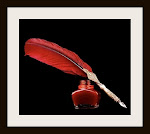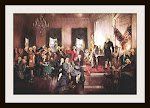
Good evening fellow citizens and patriots,
At our last encounter we saw the foundation of our nation being put down, constructed of laws and justice, a democratic republic. In our ventures, through our efforts, and with your support, our Union, as fragile as it might be in structure, has arisen to the challenge and is ready to take its place in the world as a sovereign power. I proudly present to you the United States of America.
It is once again I, Edmund Randolph of the state of Virginia (please note that we have deferred to being politically correct in naming our individualized territories) I write to you once again from Philadelphia, and as I do, I peer out through my window onto the bustling street below. Philadelphia is as vibrant at night as it is in day. I reminisce of my days at the Convention. The mess of thoughts has its plentiful share of sour ones (blasted crickets and daytime friends the flies) and some memorable ones too (Mr. Madison adopts quite a festive mood when he relishes his wine) I recall the meetings at the taverns and in the alleyway (nothing to be suspicious of) and the raucous debates (it's a miracle I have any hearing left at all) In the years succeeding that summer, I found myself once again caught in the cyclone that was politics. Once you've got a Constitution, you must implement it: and what a better person to head the operation than the General himself, General George Washington. Or rather, should I say, president? Indeed, the General was inaugurated in eighty-nine (with plenty of witnesses) and so the national government was up and running... slightly. The president was without a council to advise him in the perilous first steps of our infant nation. Therefore, by the authority vested in us by the Constitution, a collection of department heads was assembled by the man himself, a picky process, for he of all people would not pluck the random lawyer off the streets and call him important. So, in the end of it all, he is aided by the brilliance of Colonel Alexander Hamilton as his Treasury Secretary, a fellow soldier of mine in the days of patriotic fervor; blessed by the strategic thinking of his Secretary of War General Henry Knox, also a battlefield colleague of mine; and lastly Mr. Jefferson as Secretary of State, who has recently returned from his diplomatic mission in France. He has much changed since the last time we spoke. It appears he has adopted many of the mannerisms of the French aristocrat, but I pray he shall realize that nobility of such a degree will not be much favored by the people. Then there's me. Attorney General and a Federalist. What I would like to document on this paper of my life in this position so far shall begin with our most recent meeting. The meetings are generally rare, for the President prefers an encounter of two, should the matter he would need to discuss happened to be pertaining to their respective department. But in one our full-fledged meetings, which can be quite a spectacle, was discussing Hamilton's plan for a national bank. So here's how it went:
I come strutting along down the street like a peacock, quite proud of my new clothing straight from the merchant, and up the steps to the President's House. Originally the house of Mr. Morris, the President and his family of three now occupy it along with whatever servants or such they might have accompany them. But the guest bedrooms are never desolate. Whether it be the traveling lawyer or a senator, there is always a gaggle of squawking company to keep Lady Washington busy. Speaking of her, being the President's Lady, she has got quite a load on her hands. From managing a household (with which she has plenty of experience) she must also oversee dinner preparations and the like for the torrent of guests. Not to mention her two grandchildren, who accompanied them to Philadelphia. You have Washy and Nelly, two young, rambunctious children with an annoying parrot to keep them entertained. That blasted bird has mistaken my shoulder as his necessary.
But I digress. I am welcomed by the President's aide, whose name escapes me, and am shown down the hall. Vice President Adams is already there, fixing his stocking as usual, and Mr. Jefferson, who takes an immediate and profound interest in his shoe buckles when I approached. Sometimes I wonder if the man is petrified by my presence. I am, after all, his cousin. After a long, awkward silence in which everyone avoided the gaze of the person next to them, or in Mr. Jefferson's case, took to studying his shoe buckles like an unknown specimen, Colonel Hamilton arrived, his penetrating gaze speaking of unparalleled brilliance.
"Gentlemen," he said as he approached us, "you seem to have forgotten that you three speak the same language. Indeed, your shoe buckles seem to belie their extraordinary contents."
He looked at Jefferson, who evermore continued to examine those gold decorations as politely possible when awkwardness couldn't be overcome. So after some more awkward moments, the president appeared fro, his study. Although we may have known each other for many years, I am continually in awe. He stands like a ramrod with a face as silent and still as stone. He possessed the great gift of silence.
"Gentlemen," and he made a deep bow. There was a collective 'sir,' several bows, and we proceeded on to the dining room. Shamefully of me, this was my favorite part of the meetings, when we got food. Lady Washington's roast beef is something to look forward to.
"It appears that Colonel Hamilton... Has a proposal for us today?" the General inquired.
"Why, yes! None other than for a national bank!"
I swore I could hear Thomas gasp. When I looked at him, he was in utter shock.
"A... Na-na... National bank?" he whispered.
"You heard me correctly, Mr. Jefferson! Backed by gold and silver!" The room was silent. A national bank? Now that was something we had yet to experience. During and after e war years, each state had its own currency, much less a national bank! This prospect was stunning to me, although I don’t why. But I knew why Thomas’ jaw was on ground about this one. He analyzed the Constitution like a student dissecting a frog. He had probably this bank to be a contradiction.
“May I make an objection please?” He was doing his best to hold down the fiery barrage he was ready to unleash upon Hamilton.
“What bothers you, Mr. Jefferson? Is the idea daunting?” What a sly sneak, mocking my cousin like that.
“The mere idea of a national bank is unconstitutional in its nature.” What’d I tell you?
“Oh, silly Mr. Jefferson! You haven’t even heard my proposal yet!” With that, he snapped a piece of paper out of the inside of his coat, and flipped it open. He donned his eyeglasses, cleared his throat, and began to read.
“First off, a great inconvenience plagues us all as we travel from state to state. In Rhode Island, we find one certain coin, and its neighbor Massachusetts has a an entirely different one. If we are to be one unified country, we might as well have on unified currency. That’s just one aspect of the plan. The second feature is to control the national debt. By my calculations, that debt is at $50 million. As you shall see momentarily, the bank is created with the concept of… unity in mind. Funds, taxes, and the like will be handled by this institution.”
There was a great silence in the room. The number was just unfathomable. $50 million?
“It’s unconstitutional.”
Every head turned toward Mr. Jefferson.
“I beg your pardon, Mr. Jefferson?”
“It’s unconstitutional. If you take a good scan of the document, it is not stated anywhere that Congress has any right or authority to create this… national bank.”
Hamilton gave it a good long thought.
“Mr. Jefferson, do you recognize the term, ‘implied powers’?”
“Not really…”
“Well then, we learn something new each and every day. Implied powers, when used in this situation, suggests that the Constitution, while it does not directly state the authority to create a national bank, it does give the federal government power to do anything that they deem essential for this nation. That thing, essential to our very survival, is a national bank, the unifying and balancing force of this nation’s economy. That, and I am sure you will agree, is very constitutional.”
Thomas was deeply stumped. Where was James Madison when you needed him? Ah, but here he was. Just as Hamilton finished his stinging defense, Madison made a surprise visit. He took a bow and said, “Colonel Hamilton, you really ought to learn how to talk like a real gentleman, not like a riled up drunkard. I could hear from down the hall… and I heard something like a national bank."
Here we go again. You see, Madison is notorious among us Federalists for being in cahoots with Jefferson from the very beginning, and there is no doubt in my mind he will side with Jefferson about this whole bank business.
“It’s very true, Mr. Madison. The bank will unify America and reserve us a place as a sovereign power amongst the greats!”
Madison looked at him skeptically.
Washington suddenly came to the aide of his favorite subordinate, “It’s based off the Bank of England, and England appears to have a very secure and stable-“
“AHA! You see? That sneaky fool wants to turn this nation into a monarchy! This is merely the first step!” Madison was up and out of his chair. “Can’t you see, Mr. President? That man is manipulating you? Don’t be blind to the situation!”
The President, cool and calm as in most situations, replied, “Mr. Madison, such epithets and allegations will not be welcomed during this meeting. As much as you think that being of such a high age may deteriorate my ability to comprehend, I thoroughly debunk that with the evidence that the men surrounding me at this table are all of pristine credentials. If you wish to continue with such insolent comments, please make them known outside of this room.”
Madison knew better than to deal with Washington.
“Well, if you would excuse me, Mr. President,” and with that, he took his hat and exited the building.
“Colonel, make your proposal to Congress. It appears to be our only hope.”
The meeting was at an end.
Afterwards, as we were leaving, Thomas pulled me to the side.
“We cannot let this bill even enter the consideration of the congressman. The banking industry is an infinity of successive felonious larcenies. Madison was right. Colonel Hamilton, just as he attempted to block Mr. Adams’ way to the presidency, will now endeavor to move us towards a monarchy, modeled right off Great Britain. You have as much influence as me. In the best interests of your country, join us in the opposition.”
“Thomas, I cannot and will not become involved in this political quagmire of flaring tempers and contemptuous feelings. I am resolved to be a neutral between you two as the President is between England and France. I am sorry, but I just can’t descend to such a level as to bicker continuously.” I knew I had made the right decision, but the wrong thing to say. As soon as the words were out of my mouth, I could see the hurt in Thomas’ eyes.
“Then I shan’t bother you about the matter again.” He was very right about that.























No comments:
Post a Comment